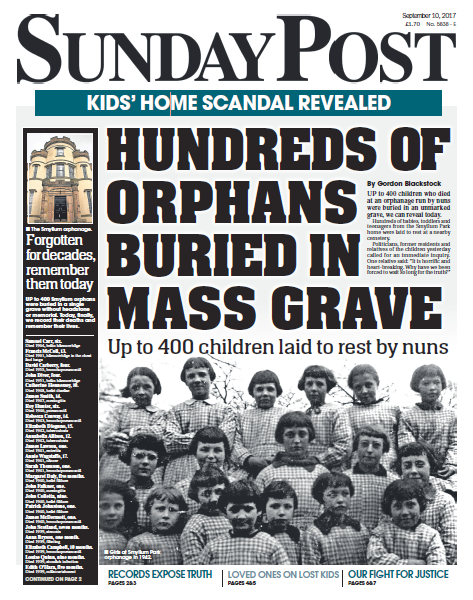
Sunday Post reporter Gordon Blackstock picked up a hat-trick of awards for his investigation into an orphanage, run by Catholic nuns, where hundreds of children died over more than a century.
He tells Press Gazette that investigative journalists must be “dogged and determined” in their approach to stories.
Blackstock’s investigation into Smyllum Park orphanage in Lanarkshire, Scotland, revealed that up to 400 children had died in the home between 1864 and 1981 – more than the religious order that ran it, the Daughters of Charity of St Vincent de Paul, had ever admitted.
Blackstock (pictured) was named Reporter of the Year and Journalist of the Year at the Scottish Press Awards, held in April, and took home Scoop of the Year for his Smyllum Park investigation.
The probe also won Front Page of the Year at the awards and saw the Sunday Post, owned by DC Thomson, named Scotland’s Newspaper of the Year.
Said Blackstock: “I guess the thing about Smyllum was, although when I first looked at it it was out of historic interest, the more I uncovered the more I started to see the bigger story.
“Former residents were still completely affected by it and were still trying to get answers.”
He added: “The religious order that ran it had previously estimated about 100 kids had died there. The real numbers are far higher and it’s something you think wouldn’t happen nowadays.
“It’s safe to assume that most, if not all, of the children are buried in the cemetery near Smyllum Park.”
Blackstock said he began investigating the orphanage in March 2017. The first stories were published six months later, in September – “It was a long slog,” he said.
While researching and writing the story, one of the former residents of Smyllum Park, Frank Doherty, who tipped Blackstock off about it, died.
“He’d been campaigning for years and tried to find out how many kids were buried but he never got the chance to see the story published,” said Blackstock.
“It was for him that the work was done, he was the origin of the story.”

The Sunday Post’s front page exclusive on the Smyllum Park scandal which was awarded Front Page of the Year at the 2018 Scottish Press Awards
Blackstock enlisted help from the BBC in order to produce the Smyllum Park investigation. BBC Radio 4 and a genealogist from the BBC programme Who Do You Think You Are all contributed to the report.
Blackstock said: “A former colleague at the Sunday Post now works for [radio programme] File on 4 and asked if there were any ideas that we had that we could work together on.
“It was a good way to maximise the impact of the story. They published a web story at the same time [as us] and did a documentary a couple of days later.”
Collaborating offers journalists the time to work on longer investigations and pool resources, seen recently with the Observer, Channel 4 News and New York Times scoop on the Cambridge Analytica data handling scandal.
For Blackstock the help of a genealogist was crucial for their research.
“We weren’t getting the answers we needed for the story from the Charity of Daughters,” he said. “In the end we had to manually sift through 15,000 death certificates to see if there were any under 18s where Smyllum was mentioned in the death certificate.
“You need to be dogged and determined and follow it through because it’s becoming increasingly frustrating for journalists when they’re dealing with the authorities.”
He said he believed the investigation was “indicative of the sort of stuff we do at the [Sunday Post]. The journalists are given the time and resources to get into investigations that they’re passionate about.
“We all have stuff that we’re working on just now that are long term projects, like Smyllum Park, and there’s no massive pressure on us to immediately produce the goods.”
He added: “I’m actually quite lucky in the sense that my boss is a former reporter so he will give you room to do investigations if that’s what it takes.”
For Blackstock it is evidence that the Sunday Post is returning to its former glory. “Historically it was quite a campaigning newspaper and it’s great that the paper is getting that recognition again,” he said.
“I’ve been at the Sunday Post for 13 years and when I first started there we didn’t get a sniff of a nomination, let alone winning
“But in that time there’s been a real push towards doing important journalism to help get the Sunday Post recognised.”
Blackstock began working at the Sunday Post as a trainee in 2005 after finishing university and said the experience held by the rest of the news room spurred him on.
“All the journalists in the team had awards and I was starting to feel a bit self-conscious not having any,” he said.
Editor of the Sunday Post, Richard Prest said: “Investigative journalism is a key part of our strategy and in the last year we have broken a number of stories that have set the agenda in Scotland.
“Investigative journalism couldn’t be more important at the moment.”
Picture: Scottish Press Awards
Email pged@pressgazette.co.uk to point out mistakes, provide story tips or send in a letter for publication on our "Letters Page" blog
